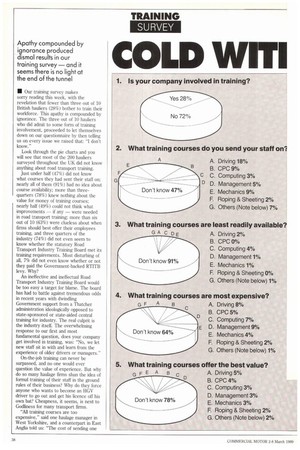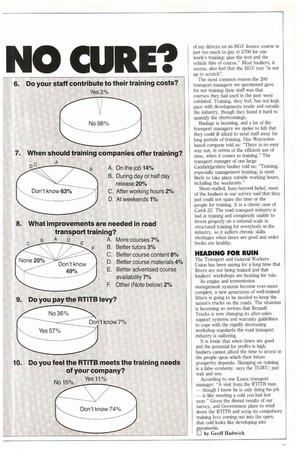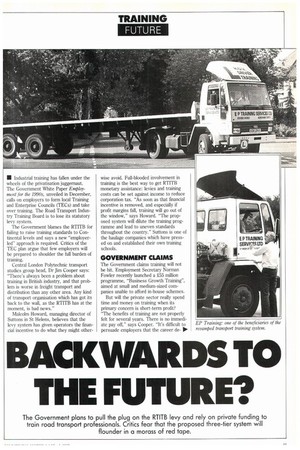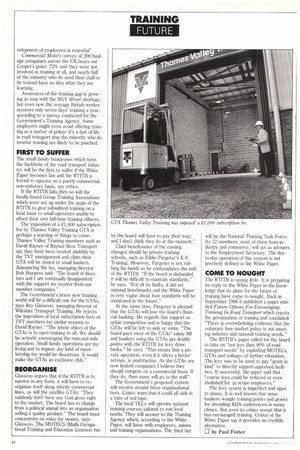COLD WITI NO CUR
Page 40

Page 41

Page 43

Page 44

If you've noticed an error in this article please click here to report it so we can fix it.
• Our training survey makes sorry reading this week, with the revelation that fewer than three out of 10 British hauliers (28%) bother to train their workforce. This apathy is compounded by ignorance. The three out of 10 hauliers who did admit to some form of training involvement, proceeded to let themselves down on our questionnaire by then telling us on every issue we raised that: "I don't know."
Look through the pie charts and you will see that most of the 200 hauliers surveyed throughout the UK did not know anything about road transport training.
Just under half (47%) did not know what courses they had sent their staff on; nearly all of them (91%) had no idea about course availability; more than threequarters (78%) knew nothing about the value for money of training courses; nearly half (49%) could not think what improvements — if any — were needed in road transport training; more than six out of 10 (63%) were clueless about when firms should best offer their employees training, and three quarters of the industry (74%) did not even seem to know whether the statutory Road Transport Industry Training Board met its training requirements. Most disturbing of all, 7% did not even know whether or not they paid the Government-backed RTITB levy. Why?
An ineffective and ineffectual Road Transport Industry Training Board would be too easy a target for blame. The board has had to battle against tremendous odds in recent years with dwindling Government support from a Thatcher administration ideologically opposed to state-sponsored or state-aided central training for industry. The real culprit is the industry itself. The overwhelming response to our first and most fundamental question, does your company get involved in training, was: "No, we let new staff sit in with and learn from the experience of older drivers or managers."
On-the-job training can never be surpassed, and no one would ever question the value of experience. But why do so many haulage firms shun the idea of formal training of their staff in the ground rules of their business? Why do they force anyone who wants to become an HGV driver to go out and get his licence off his own bat? Cheapness, it seems, is next to Godliness for many transport firms.
"All training courses are too expensive," said one haulage manager in West Yorkshire, and a counterpart in East Anglia told us: "The cost of sending one of my drivers on an HGV licence course is just too much to pay at £700 for one week's training; plus the test and the vehicle hire of course." Most hauliers, it seems, also feel that the HGV test "is not up to scratch".
The most common reason the 200 transport managers we questioned gave for not training their staff was that courses they had used in the past were outdated. Training, they feel, has not kept pace with developments inside and outside the industry, though they found it hard to quantify the shortcomings, Haulage is booming, and a lot of the transport managers we spoke to felt that they could ill afford to send staff away for long periods of training. One Worcesterbased company told us: "There is no easy way out, in terms of the efficient use of time, when it comes to training." The transport manager of one large Cambridgeshire haulier told us: "Training, especially management training, is most likely to take place outside working hours, including the weekends."
Short-staffed, busy-beyond-belief, most of the hauliers in our survey said that they just could not spare the time or the people for training. It is a classic case of Catch 22. The road transport industry is bad at training and completely unable to invest properly on a national scale in structured training for everybody in the industry, so it suffers chronic skills shortages when times are good and order books are healthy.
HEADING FOR RUIN
The Transport and General Workers Union has been saving for a long time that fitters are not being trained and that hauliers' workshops are heading for ruin.
As engine and transmission management systems become ever-more complex, a new generation of well-trained fitters is going to be needed to keep the nation's trucks on the roads. The situation is becoming so serious that Renault Trucks is now changing its after-sales support systems and warranty guidelines to cope with the rapidly decreasing workshop standards the road transport industry is suffering.
It is ironic that when times are good and the potential for profits is high, hauliers cannot afford the time to invest in the people upon which their future prosperity depends. Skimping on training is a false economy, says the TGWU: just wait and see.
According to one Essex transport manager: "A visit from the RTITB man — though I know he is only doing his job — is like meeting a cold you had last year." Given the dismal results of our survey, and Government plans to wind down the RTITB and scrap its compulsory training levy coming out into the open, that cold looks like developing into pneumonia.
LJ by Geoff Hadwick IN Industrial training has fallen under the wheels of the privatisation juggernaut. The Government White Paper Employment for the 1990s, unveiled in December, calls on employers to form local Training and Enterprise Councils (TECs) and take over training. The Road Transport Industry Training Board is to lose its statutory levy system.
The Government blames the RTITB for failing to raise training standards to Continental levels and says a new "employerled" approach is required. Critics of the TEC plan argue that few employers will be prepared to shoulder the full burden of training.
Central London Polytechnic transport studies group head, Dr Jim Cooper says: "There's always been a problem about training in British industry, and that problem is worse in freight transport and distribution than any other area. Any kind of transport organisation which has got its back to the wall, as the RTITB has at the moment, is bad news."
Malcolm Howard, managing director of Suttons in St Helens, believes that the levy system has given operators the financial incentive to do what they might other
wise avoid. Full-blooded involvement in training is the best way to get RTITB monetary assistance: levies and training costs can be set against income to reduce corporation tax. "As soon as that financial incentive is removed, and especially if profit margins fall, training will go out of the window," says Howard. "The proposed system will dilute the training programme and lead to uneven standards throughout the country." Suttons is one of the haulage companies which have pressed on and established their own training schools.
GOVERNMENT CLAIMS
The Government claims training will not be hit_ Employment Secretary Norman Fowler recently launched a 255 million programme, "Business Growth Training", aimed at small and medium-sized companies unable to afford in-house schemes.
But will the private sector really spend time and money on training when its primary concern is short-term profit? "The benefits of training are not properly felt for several years. There is no immediate pay off," says Cooper. "It's difficult to persuade employers that the career deIP'
velopment of employees is essential".
Commercial Motor's survey of 200 haulage companies across the UK bears out Cooper's point: 72% said they were not involved in training at all, and nearly half of the minority who do send their staff to be trained have no idea what they are learning.
Awareness of the training gap is growing in step with the HGV driver shortage, but even now the average British worker receives only seven days' training a year, according to a survey conducted for the Government's Training Agency. Some employers might even avoid offering training as a matter of policy: it's a fact of life in road transport that the minority who do receive training are likely to be poached.
FIRST TO SUFFER
The small family businesses which form the backbone of the road transport industry will be the first to suffer if the White Paper becomes law and the RTITB is forced to operate on a purely commercial, non-statutory basis, say critics.
If the RTITB falls, then so will the locally-based Group Training Associations which were set up under the aegis of the RTITB to give subsidized training on a local basis to small operators unable to afford their own full-time training officers.
The imposition of a 21,000 subscription fee by Thames Valley Training GTA is perhaps a warning of things to come. Thames Valley Training members such as David Rayner of Rayner Bros Transport say they have been treated shabbily by the TVT management and claim their GTA will be closed to small hauliers. Announcing the fee, managing director Bob Sturgess said: "The board of directors and I are continually disappointed with the support we receive from our member companies."
The Government's brave new training world will be a difficult one for the GTAs, says Ray Glasscoo, managing director of Wiltshire Transport Training. He rejects the imposition of local subscription fees on TVT members for similar reasons to David Rayner. "The whole object of the GTAs is to open training to all. We should be actively encouraging the man-and-wife operation. Small family operations are my living and to impose any kind of membership fee would be disastrous. It would make the GTAs an exclusive club."
REORGANISE
Glasscoo argues that if the RTITB is to survive in any form, it will have to reorganise itself along strictly commercial lines, as will the satellite GTAs. "They suddenly don't have any God-given right to the market. The board has to change from a political animal into an organisation selling a quality product." The board must concentrate on value for money, says Glasscoo. The MOTECS (Multi Occupational Training and Education Centres) run by the board will have to pay their way; and I don't think they do at the moment."
Chief beneficiaries of the coming changes should be private training schools, such as Eddie Pargeter's E P Training. However, Pargeter is not rubbing his hands as he contemplates the end of the RTITB: "If the board is disbanded it will be difficult to maintain standards," he says. "For all its faults, it did set national benchmarks and the White Paper is very vague about how standards will be monitored in the future."
At the same time, Pargeter is pleased that the GTAs will lose the board's financial backing. He regards this support as unfair competition and is happy that the GTAs will be left to sink or swim. "The board pays most of the GTAs' salary bill and hauliers using the GTAs get double points with the RTITB for levy drawbacks," he says. "This means that a private operation, even if it offers a better service, is unattractive. As the GTAs are now limited companies I believe they should compete on a commercial basis. If they do, then many will go to the wall".
The Government's proposed system will revolve around three organisational tiers. Critics warn that it could all sink in a mire of red tape.
The local TECs will operate national training courses tailored to suit local needs. They will answer to the Training Agency which, according to the White Paper, will liaise with employers, unions and training organisations. The third tier will be the National Training Task Force. Its 12 members, most of them from industry and commerce, will act as advisers to the Employment Secretary. The dayto-day operation of this system is not precisely defined in the White Paper.
COME TO NOUGHT
The RTITB is saying little. It is preparing its reply to the White Paper in the knowledge that its plans for the future of training have come to nought. Back in September 1986 it published a paper entitled Future Options For Encouraging Training In Road Transport which rejects the privatisation of training and concluded: "There is overwhelming evidence that the voluntary free market policy is not meeting industry and national training needs."
The RTITB's paper called for the board to take on "not less than 90% of road transport needs" by exploiting MOTECs, GTAs and colleges of further education. The levy was to be used to pay "grant in kind" to directly support-approved facilities. If successful, the paper said that "course fees could be reduced or even abolished for -in-scope employers."
The levy sysem is imperfect and open to abuse. It is well known that some hauliers wangle training points and grants for attending RHA conferences in sunny climes. But even its critics accept that it has encouraged training. Critics of the White Paper say it provides no credible alternative.




















































































































































